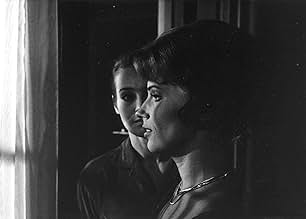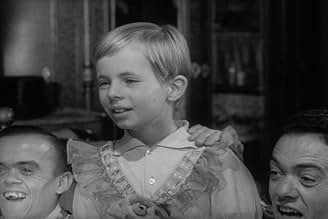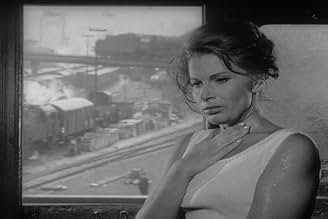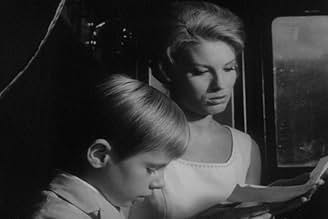Two estranged sisters, Ester and Anna, and Anna's 10-year-old son travel to the Central European country on the verge of war. Ester becomes seriously ill and the three of them move into a ho... Read allTwo estranged sisters, Ester and Anna, and Anna's 10-year-old son travel to the Central European country on the verge of war. Ester becomes seriously ill and the three of them move into a hotel in a small town called Timoka.Two estranged sisters, Ester and Anna, and Anna's 10-year-old son travel to the Central European country on the verge of war. Ester becomes seriously ill and the three of them move into a hotel in a small town called Timoka.
- Awards
- 3 wins & 2 nominations
- Woman in Variety Hall
- (uncredited)
- The Paperboy
- (uncredited)
- Man in Variety Hall
- (uncredited)
- Impressario
- (uncredited)
- The Bar Owner
- (uncredited)
- The Doorkeeper
- (uncredited)
- Anna
- (uncredited)
- The Cashier
- (uncredited)
- The Old Man
- (uncredited)
- Director
- Writer
- All cast & crew
- Production, box office & more at IMDbPro
Storyline
Did you know
- TriviaThe controversy the movie acquired for being sexually explicit resulted in a much larger audience than most Ingmar Bergman films. When Bergman realized this, he commented that it had attracted the most unwanted viewers of any of his pictures.
- Quotes
Ester: I didn't want to accept my wretched role. But now it's too damn lonely. We try out attitudes and find them all worthless. The forces are all too strong. I mean the forces... the horrible forces. You need to watch your step among all the ghosts and memories.
Ester: All this talk... There's no need to discuss loneliness. It's a waste of time.
- Alternate versionsThe original UK cinema release featured the pre-edited US print which was then cut by a further 35 secs by the BBFC to shorten some shots of Ester stroking Anna's hair and to replace subtitled references to erections and semen. The 1999 Tartan video is the complete version.
- ConnectionsEdited into Journal d un père (2023)
- SoundtracksGoldberg Variations, BWV 988 - Variatio 25
Music by Johann Sebastian Bach
The first is the theological/existential perspective. Contrary to many published reviews on the trilogy, I find the three films affirm the existence of God in the face of doubt. What is the silence referring to? God appears to be quiet; yet the ailing Ester communicates with her nephew by providing him a piece of paper with a foreign word "hadjek" that means "soul" or "spirit". Is that a word that a woman disillusioned with existence of God would pass on to her nephew on her deathbed? I have doubts about Bergman's professed agnosticism. "Hadjek" is the last word of The Silence spoken by Johan reading from the list of foreign words from Ester's letter to him that he jealously guards from his own mother Anna. Somewhat like "rosebud" in Citizen Kane. Again there are two shots towards the end of The Silence that offer Christian symbolism affirming faith in God. First, there is the last shot of Ester her face directed at light from the window, fully exposed to light, as she waits for her eventual death, content at having passed on the letter to her nephew. The second is the last shot of Anna her bathing her face in rainwater (a symbol of baptism) having read the contents of the letter that Johan holds in his hands.
Now Bergman gave names to his film's characters with considerable thought, incorporating Biblical connections that he probably picked up from his father's sermons. The priest Tomas in Winter Light is so named because St Thomas doubted the resurrection of Christ, just as Tomas is questioning the existence of God. Ester in The Silence is obviously named after the Biblical book Esther, one of the only two books in the Bible that does not mention God directly. Does the absence of God mean the book is not holy? By corollary, does the silence of God mean that God does not exist? For the atheist viewer of The Silence, too, there is sufficient room to record the director's observation of deserted churcheswhen Anna truthfully confesses to her elder sister that she had sex with a waiter in an empty church. For the existentialist viewer, there is silence from God to the cries of help from Ester. Yet another way to appreciate The Silence is to study the physical silence in the film. Spoken words are indeed few. The film begins with the tick-tock of a watch/clock, which stops when the characters break their silence. The watch is also a metaphor for the limited time of life on earth available for each individual. The sound of the tick-tock increases when Ester is unable to breath and is mortally afraid of dying from suffocation. It is also heard when Anna is reflecting on her post-coital satisfaction in her hotel room. Words are fewthe foreign words learnt in the unnamed country relate to "hand", "face" and finally "soul". Much of the visual communication relates to "hands" and "faces", particularly those of Ester. Ester's hands move even when she is sleeping. Ester's hand caresses Anna's hair but stops short of touching the face. The denizens of the unnamed country hardly speak, yet we know all is not well, with tanks moving in the night and underfed horses pulling carts of furniture to nowhere. Death seems around the corner. One of the few other sounds we hear is the click of the toy gun, disturbing the cleaner of the chandelier. Then there is the clank of the tank negotiating the narrow street outside the hotel. More importantly, silence in the film between individual characters in the film, existing side by side with the theological silence.
A third way to evaluate complex issues of The Silence is to study the camera-work of Sven Nykvist. Much of the brilliance of the black-and-white film revolves around shadows and light, mirrors and last but not the least, close-ups. The carnal events are captured in shadows, while epiphanies are swathed in bright light. Nykvist and Bergman use mirrors to indicate the lack of direct communication or rather the presence of bounced communication. When Ester, the translator of languages cannot converse with the maitre d'hotel, she resorts to sign languageeven the boy Johan prefers Punch and Judy to communicate his feelings rather than read a book for his sick aunt. The extraordinary performance of one of cinema's finest actresses, Ingrid Thulin, would have been difficult to perceive were it not for Nykvist's close-ups of her face and hands.
A fourth way to approach The Silence is the character of the young boy Johan, who probably is the personification of the young Bergman. Johan is a mix of irreverence (he urinates in the hotel corridor) and innocence (he willingly cross-dresses at the behest of the dwarfs). He is attached to his mother, but respects his aunt even more. As the film un-spools, it is evident that he obeys his mother but is able to connect with the aunt's higher level of intellect, quite aware that she is dying. Johan's father exists but is not physically present. Johan is figuratively squeezed between his mother lacking a "conscience" and an aunt with a domineering and an implied lesbian relationship with his own mother. It is not a perfect life for a boy. Indirectly, Bergman wants the viewer to step into Johan's shoes, irreverent yet innocent and loving. Johan is first introduced to death by the personal collection of family photographs of the maitre d'hotel, including photographs of his dead wife. But John prefers to hide them beneath the carpet but resurrects the subject in his own Punch and Judy show for his aunt.
Then you can look at The Silence as the quintessential Ingrid Thulin film. In The Silence her facial expressions are the very imprints one associates with Peter O'Toole's thespian turns in cinema. It is no wonder that she acted in films of topnotch directors: Bergman, Visconti, Resnais and Minnelli.
- JuguAbraham
- Oct 2, 2008
- Permalink
- How long is The Silence?Powered by Alexa
Details
- Release date
- Country of origin
- Languages
- Also known as
- Das Schweigen
- Filming locations
- Production company
- See more company credits at IMDbPro
Box office
- Gross worldwide
- $14,199
- Runtime1 hour 36 minutes
- Color
- Aspect ratio
- 1.37 : 1
Contribute to this page




























